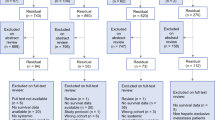Summary
Purpose Hepatobiliary cancers respond poorly to cytotoxic chemotherapy. We evaluated the activity and safety of ixabepilone, an epothilone B analogue which stabilizes microtubules, in a phase II trial in patients with advanced cancers of the gallbladder, bile duct, and liver. Methods Eligible patients had previously-untreated, histologically-proven unresectable hepatobiliary cancer. Ixabepilone, 40 mg/m2, was administered intravenously over 3 h every 21 days. Results Between January 2002 and April 2005, 54 patients (19 hepatocelluar carcinoma, 13 cholangiocarcinomas, 22 gallbladder carcinomas) were enrolled; 47 patients were evaluable for efficacy. The objective response rate was 8.5%; 51% had stable disease. Median overall survival was 7.0 months (95% CI, 5.0 to 10.8 months) and median progression-free survival was 2.6 months (95% CI, 1.4 to 4.1 months). Grade 3/4 toxicities included neutropenia (39%), fatigue (9%), allergic/hypersensitivity reaction (4%) and sensory neuropathy (4%). Conclusion Single agent ixabepilone has limited activity in advanced hepatobiliary cancers.

Similar content being viewed by others
References
Jemal A, Siegel R, Ward E et al (2008) Cancer statistics, 2008. CA Cancer J Clin 58:71–96
Smith RA, Cokkinides V, Eyre HJ (2005) American cancer society guidelines for the early detection of cancer, 2005. CA Cancer J Clin 55:31–44 quiz 55-36
Patel T (2002) Worldwide trends in mortality from biliary tract malignancies. BMC Cancer 2:10
El-Serag HB, Davila JA, Petersen NJ, McGlynn KA (2003) The continuing increase in the incidence of hepatocellular carcinoma in the United States: an update. Ann Intern Med 139:817–823
de Groen PC, Gores GJ, LaRusso NF et al (1999) Biliary tract cancers. N Engl J Med 341:1368–1378
Huang M, Liu G (1999) The study of innate drug resistance of human hepatocellular carcinoma Bel7402 cell line. Cancer Lett 135:97–105
Kato A, Miyazaki M, Ambiru S et al (2001) Multidrug resistance gene (MDR-1) expression as a useful prognostic factor in patients with human hepatocellular carcinoma after surgical resection. J Surg Oncol 78:110–115
Kuo MT, Zhao JY, Teeter LD et al (1992) Activation of multidrug resistance (P-glycoprotein) mdr3/mdr1a gene during the development of hepatocellular carcinoma in hepatitis B virus transgenic mice. Cell Growth Differ 3:531–540
Simonetti RG, Liberati A, Angiolini C, Pagliaro L (1997) Treatment of hepatocellular carcinoma: a systematic review of randomized controlled trials. Ann Oncol 8:117–136
Andre T, Tournigand C, Rosmorduc O et al (2004) Gemcitabine combined with oxaliplatin (GEMOX) in advanced biliary tract adenocarcinoma: a GERCOR study. Ann Oncol 15:1339–1343
Harder J, Riecken B, Kummer O et al (2006) Outpatient chemotherapy with gemcitabine and oxaliplatin in patients with biliary tract cancer. Br J Cancer 95:848–852
Goodin S, Kane MP, Rubin EH (2004) Epothilones: mechanism of action and biologic activity. J Clin Oncol 22:2015–2025
Lee FY, Borzilleri R, Fairchild CR et al (2001) BMS-247550: a novel epothilone analog with a mode of action similar to paclitaxel but possessing superior antitumor efficacy. Clin Cancer Res 7:1429–1437
Gadgeel SM, Wozniak A, Boinpally RR et al (2005) Phase I clinical trial of BMS-247550, a derivative of epothilone B, using accelerated titration 2B design. Clin Cancer Res 11:6233–6239
Zhuang SH, Agrawal M, Edgerly M et al (2005) A Phase I clinical trial of ixabepilone (BMS-247550), an epothilone B analog, administered intravenously on a daily schedule for 3 days. Cancer 103:1932–1938
Abraham J, Agrawal M, Bakke S et al (2003) Phase I trial and pharmacokinetic study of BMS-247550, an epothilone B analog, administered intravenously on a daily schedule for five days. J Clin Oncol 21:1866–1873
Therasse P, Arbuck SG, Eisenhauer EA et al (2000) New guidelines to evaluate the response to treatment in solid tumors. European Organization for Research and Treatment of Cancer, National Cancer Institute of the United States, National Cancer Institute of Canada. J Natl Cancer Inst 92:205–216
Simon R (1989) Optimal two-stage designs for phase II clinical trials. Control Clin Trials 10:1–10
Brookmeyer R, Crowley J (1982) A confidence interval for the median survival time. Biometrics 38:29–41
Venook A, Poon R, Kang YK (2007) Evaluation of patupilone as monotherapy in patients with advanced hepatocellular carcinoma (HCC). J Clin Oncol 25:15055 ASCO Annual Meeting Proceedings
Llovet JM, Ricci S, Mazzaferro V et al (2008) Sorafenib in advanced hepatocellular carcinoma. N Engl J Med 359:378–390
Author information
Authors and Affiliations
Corresponding author
Additional information
Supported by NCI grant N01-CM-17102
Rights and permissions
About this article
Cite this article
Nimeiri, H.S., Singh, D.A., Kasza, K. et al. The epothilone B analogue ixabepilone in patients with advanced hepatobiliary cancers: a trial of the University of Chicago Phase II Consortium. Invest New Drugs 28, 854–858 (2010). https://doi.org/10.1007/s10637-009-9297-6
Received:
Accepted:
Published:
Issue Date:
DOI: https://doi.org/10.1007/s10637-009-9297-6




